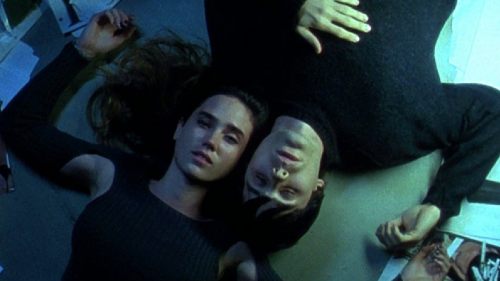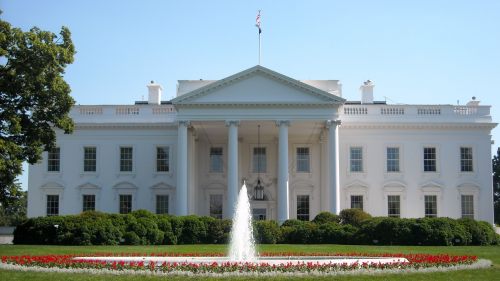NOAH Director Darren Aronofsky Ponders Whether Man Is Worth Saving
When I sat down with Darren Aronofsky to talk about Noah he was really tired. He had been doing the junket thing for a few days after having traveled around the globe to different premieres of the movie. And that came on the heels of making the damn thing, followed by the epic battle with Paramount over just what cut would be released (it ended up being his). I talked to Aronofsky late on Sunday afternoon, and he was deep into soundbite mode after a day of dealing with fluff tabloid types. But he quickly shook that off and the ten minutes we had scheduled ballooned to twenty-five.
Those twenty-five minutes are not all here. I'll be sharing some of Aronofsky's thoughts about the mythology of Noah over the weekend (and we're trying to schedule a longer chat to go even more in-depth), but I also wanted to share with you this section of the conversation, where we talked about the larger messaging of the film. Darren Aronofsky is a vegan and an environmentalist, things that hugely inform the movie. Despite conservative fears Noah isn't exactly a global warming movie, but it does feature such far-left ideas as "Maybe we shouldn't just destroy the environment" and "Hey, perhaps we could all treat each other better." You know, real Commie stuff.
Old Testament stories don't tend to make good modern movies because they're often about submission to God. We like stories about overcoming things, not bowing down to them, and the story of Noah is one of a guy who takes his orders from God instead of being about a guy who exerts his will or makes a stand against authority or other stuff secular humanists like. How did you approach this?
We had to figure out how to dramatize this story. It’s only four chapters, and there aren’t many characters at all. Noah doesn’t have much of a character arc, but in the story The Creator really does have an arc. He starts off in a place of wanting justice and gets to a place of mercy and grace and acceptance. That right there is an arc - with a C.
There’s a huge contradiction in the story. God is so fed up with Man and what Man has done to each other and to the world that he wants to wipe them off the face of the Earth. It says in the Bible that it grieved him to his heart, but in the end he comes to a place of mercy. That anger was something we had to connect to the character of Noah. It’s interesting that in the story Noah just follows everything that God wants him to do.
He doesn’t have a second of doubt in the story.
Not a second. What Ari and I decided was, let’s connect Noah to God’s arc. Noah is different from other men in the world in that he understands what Man has done to the planet and to each other, and he wants justice. For us he’s coming from that point of view at the start of the film, and it was interesting to us that he becomes the antagonist for a while. For a while you don’t know who to root for, which is really an exciting idea. Especially in a huge blockbuster film, where it’s always clear who the protagonist is. But in this film there’s a moment where you wonder, ‘Should I be rooting for the bad guy?’ We always knew there would be people in the audience who actually agree with what Tubal-Cain is saying.
There’s a seeming contradiction in the story of the Garden of Eden, which is in Genesis 2:15 God tells Adam that he’s supposed to tend and keep the Garden. Then there’s another passage where he says that Man should take dominion over the Garden. It’s very clear right now on this planet that we’ve taken dominion, but the question is have we tended the Garden.
We’ve not been good stewards.
Exactly. It’s great - Pope Francis is now talking about it, and it’s becoming part of people’s thoughts, but that sort of conflict seemed like an interesting place to split the bloodlines of Cain and Seth in our mythology. In the Bible Adam and Eve have three sons, and Cain kills one of them, Abel, and then there’s the third son, Seth. Seth’s line is Noah’s line, and we decided that would be more connected to tending the Garden. Cain’s line would be about taking dominion over it. This is a big debate that’s out there in the political sphere, people are talking about how do we take care of our ecology and our world, but I don’t know if we have to choose sides. In many ways dominion has won - there isn’t a corner of the Earth that people haven’t been to.
When I was a kid I went into some extreme areas around the world. I spent six weeks in Prince William Sound in Alaska studying seals, studying thermal regulation in seals, and we went to places where there were no people. No people had been there, or maybe a random soul had been there. And then two years later the Exxon Valdez was there. That doesn’t really exist anymore. Now every corner of the Earth is touched by a reality TV show, where they’re dropping people off and saying ‘Can you survive in this landscape?’
Noah gets to an interesting moral dilemma, one that feels very modern. Every day we make advances in medicine and conquer diseases and people live longer and there are more of us - but we’re not living sustainably. It’s interesting to watch this film and apply Noah’s conflict to our world now: how much are we worth saving?
That gets to some very radical ideas. It turns into some other…
It gets really ugly really fast, just as it does in the film.
It gets ugly from there. That’s not a direction. I think it’s about finding balance. A hundred years ago… I was writing a Western a few years ago, and it was set in 1860, and I realized that if every person in the world were to disappear at that moment I realized that everything - aside from some forged metal and belt buckles and bullets - everything would be gone in a couple of hundred years. It would all be gone. Now every single plastic bottle is here forever, or for a really long time. In the last fifty years our impact has been remarkable. The scarring is so deep. And it’s in every element - it isn’t just global warming, it has to do with all different chemicals and substances we’ve created and unleashed. You look inside that iPhone and who knows what the hell is in there and what the impact of that is on different places in the world. And you look at Fukushima… it’s just there are these impacts that are very clear and very present.
There was a time recently when it was a different situation. The question is can we get things under control. I don’t know what happens when it’s too late - no one knows what happens when it’s too late. But clearly the large mammals on this planet are pretty endangered and going pretty quickly. We’ll see what happens.



